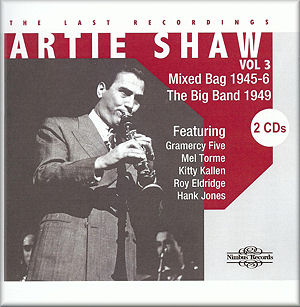CD1: Mixed Bag 1945-6
1. The Hornet
2. The Glider
3. Love of my Life
4. Let’s Walk
5. Love for Sale
6. My Heart Belongs to Daddy
7. Begin the Beguine
8. Get Out of Town
9. What is This Thing Called Love?
10. Guilty
11. I’ve Got the Sun in the Morning
12. Changing My Tune
13. It’s the Same Old Dream
14. Anniversary Song
15. For You, For Me, For Evermore
16. I Believe
17. When You're Around
18. Connecticut
19. Sunny Side Up
CD2: The Big Band 1949
1. Krazy Kat
2. I Cover the Waterfront
3. Fred’s Delight
4. Stardust
5. Aesop’s Foibles
6. Orinoco
7. They Can’t Take that Away from Me
8. Smooth ‘n Easy
9. I Get a Kick Out of You
10. Afro-Cubana
11. So Easy
12. ‘Swonderful
13. Innuendo
14. Similau
15. Carnival
16. Mucho de Nada
The sleeve-notes inform me that the personnel for CD1 was not documented
well at the time and has been put together from many sources. The
experienced jazz listener will recognise some of the musicians, but
no one can fail to recognise the leader’s brilliant clarinet playing.
Bearing in mind that these recordings come from 1945/6, the standard
of the playing is excellent and the recordings themselves have stood
the test of time very well. Nimbus Records are to be congratulated:
they have done all Artie’s many fans a great favour by putting this
valuable material on to a new recording.
Another instantly recognisable voice is that of Mel Tormé on track
8; there is also a string section on that track. And on track 9, we
have not only Mel Tormé, but the Mel-tones as well. Mel also takes
the vocal on track 10 and is featured again with the Mel-tones on
track 11. They are also featured on tracks 11 to 18. Track 19 is the
Gramercy Five with Joe Roland (vibes), Hank Jones (piano), Tal Farlow
(guitar), Tommy Potter (bass), and Irv Kluger (drums).
Although some of the personnel are not known, the music on CD1 is
good throughout. On the earlier tracks there is some fine tenor playing
(Herbie Steward?) and Shaw’s clarinet playing was at that time in
a class of a very few: BG perhaps was his only real competition. It
was also good to hear both Mel Tormé and a really good vocal group
in action. These are still very demanding arrangements even by today’s
standards and they would represent quite a challenge to any band to
play them well!
There is a lot more information available for CD2. The personnel
was:
Artie Shaw – Clarinet
Dan Palladino, Don Fagerquist, Dale Pierce, Vic Ford – Trumpets
Sonny Russo, Fred Zito, Angie Callea, Porky Cohen – Trombones
Herbie Steward, Frank Socolow, Al Cohn, Zoot Sims, Danny Bank – Saxes
Gil Barrios - Piano
Jimmy Raney - Guitar
Dick Nevison - Bass
Irv Kluger - Drums
Quite a few of these musicians were destined to be jazz stars in
their own right, but they were probably not that well known in 1949.
Artie had by this time started to absorb the music that the "boppers"
were playing and whereas a lot of the top musicians of his generation
tried to rubbish the new music, he embraced it. He went further and
commissioned arrangements from the likes of Johnny Mandel, Tadd Dameron
and Ray Conniff. Some of the tracks from this session were released
on 78s, but this entire session has never been available before. It
seems a great shame because this was a great band. Again I must thank
Nimbus for saving it for our delectation.
Apart from Artie on clarinet, the soloists are:
Tenor sax – Al Cohn (Zoot Sims on track 2)
Trumpet – Don Fagerquist, (Don Palladino on track 4)
Trombone – Sonny Russo (Innuendo), Fred Zito (Stardust)
The programme is a mixture of the familiar and the new, just the
way I like it, as do most people. Some of the new numbers are quite
adventurous and certainly must have presented the musicians with something
of a challenge. They Can’t Take That shows off the change in
Shaw’s style that occurred as he took on board the new music and the
immaculate section playing displays his ability to organise a band
to play in the way he wanted.
The band does not sound unduly dated, considering that the recording
is now some 60 years old, and the tenor solos from Al Cohn are played
in the style he retained for the remainder of his career; his playing
was always warm and inventive.
Collectors of big-band music and jazz should not be without this
double CD set.
Don Mather
See an additional review by Pierre Giroux
